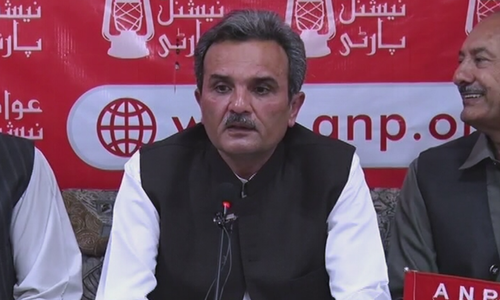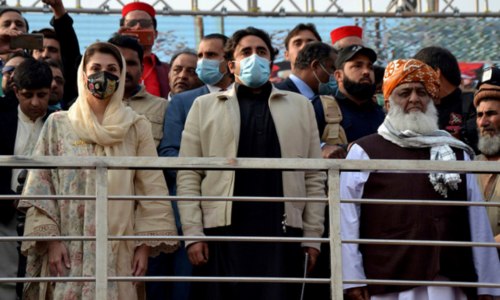THE Pakistan Democratic Movement (PDM), the most recent of the alliances of opposition political parties, is facing an existential threat. The ANP, one of the 10 constituent parties, has already announced its decision to dissociate itself from the alliance. The PPP is so far holding on. However, it has not tried to hide its extreme displeasure over the PDM letter demanding an explanation from the party about the unilateral assumption of office of the leader of the opposition in the Senate by its nominee Yusuf Raza Gilani, after reportedly agreeing at a PDM meeting to leave the position for the PML-N. And earlier, the PPP, unlike the other nine parties, had opposed the idea of linking the long march to resignation from the assemblies.
Although, the PDM had listed 26 points in its founding charter, the key objective of the alliance was to put public pressure on the PTI government to counter the latter’s alleged victimisation of the top opposition leadership. And while the removal of Prime Minister Imran Khan and his government was the stated goal, the PDM would have lived with a government which was ready to establish a working relationship with the opposition. Apparently, the PTI government, because of the political consideration to not appear to compromise with the opposition, kept the pressure on the opposition through accountability and other cases, arrests and the denial of even basic facilities permissible under the rules to imprisoned leaders. The opposition literally had its back to the wall. The PDM decision to launch a public movement, therefore, seemed justified to offset the government pressure.
Read: PDM collapse no relief for PTI
Mass contact was the first phase of the PDM movement under which it organised around 20 public meetings in the four provinces. This phase of the movement was arguably successful as large crowds turned up and leaders’ speeches, in general, resonated with the public’s sentiment. Although the first five rallies in the four provinces generated good momentum, the Lahore jalsa on an extremely chilly and wet December evening fell short of expectations and, according to some commentators, broke the momentum. Although 2pm was the time of the rally, the leadership arrived at the venue after sunset and while the crowd was waiting in the bitter cold, television channels ran the visuals of an elaborate lunch hosted by a local leader for the PDM leadership.
The mass-contact drive was to culminate in a long march from various parts of the country to Islamabad. The long march was originally scheduled for January 2021 which was obviously an unsuitable time of the year for such activity because the participants were expected to stage a sit-in in the punishing cold weather of Islamabad. Perhaps January was selected because at least a part of the PDM leadership felt it was necessary to make a final bid to dislodge the PTI government before the Senate election in March when the PTI was expected to make major gains and become the largest party there.
Already with its back to the wall, the PDM can hardly afford the growing divisions within
There was utter lack of clarity about the proposed long march. Some parties, like the PML-N and JUI-F, stated that the long march would invariably include a sit-in but nobody was clear how long such a sit-in would or should last. The PPP, however, didn’t seem to support a sit-in and said that along with other parties such as the PML-N, it had opposed a similar sit-in by the PTI in 2014. The long march was, however, later deferred until March indicating weak planning.
But the most mismanagement was seen in the context of the proposed resignations from the national and provincial assemblies. PDM president Maulana Fazlur Rehman, announced that resignations were being considered to disrupt the Senate election and prevent the PTI from gaining a majority there. The PML-N also seemed to agree with him. It was the PPP and its lawyers who later convinced the PDM leadership that resignations from the assemblies would not impact the Senate election timetable. The positions taken by the JUI-F and PML-N on resignations before the Senate election also indicated the lack of homework done by most PDM parties because the Elections Act 2017 is very clear that any vacancy in the assemblies would not affect the legitimacy of the Senate election.
Most recently, on March 16, the PDM summit meeting discussed preparations for the long march scheduled for March 26 and all parties except the PPP favoured resignations from the assemblies at the same time as the long march. The PPP, for whom the provincial government in Sindh would be at stake, did not agree. Not only was the long march indefinitely deferred, the very unity of the PDM was also in jeopardy. It was unrealistic to expect the PPP would agree with the other parties’ view on resignations because all decisions in such alliances are conventionally based on unanimity rather than a majority vote. And it was difficult for the PPP to understand the other PDM parties’ logic that resignations would lead to the downfall of the PTI government.
The PDM’s seven-point action plan had also mentioned a struggle within the legislatures including efforts for a no-confidence motion against the government but this aspect of the struggle was not given much attention.
While the public rallies and marches are legitimate democratic means to protest and mobilise the people, the current situation with surging infections may not be favourable for such activities.
In the meantime, it may be a good idea for the opposition to focus on activities within the legislatures. Recently, a private member’s bill contested by the opposition was passed by the National Assembly Committee on the Interior because, despite being in a majority in the committee, the opposition members failed to show up at the meeting. Such situations can be avoided if the opposition gives at least equal importance to the work within the legislatures. With a large opposition bloc in the National Assembly and the Punjab Assembly, a majority in the Senate and a provincial government in Sindh, a well-managed opposition alliance can play a very effective role in keeping the government in check.
The writer is president of the Pakistan Institute of Legislative Development And Transparency.
president@pildat.org
Twitter: @ABMPildat
Published in Dawn, April 10th, 2021














































